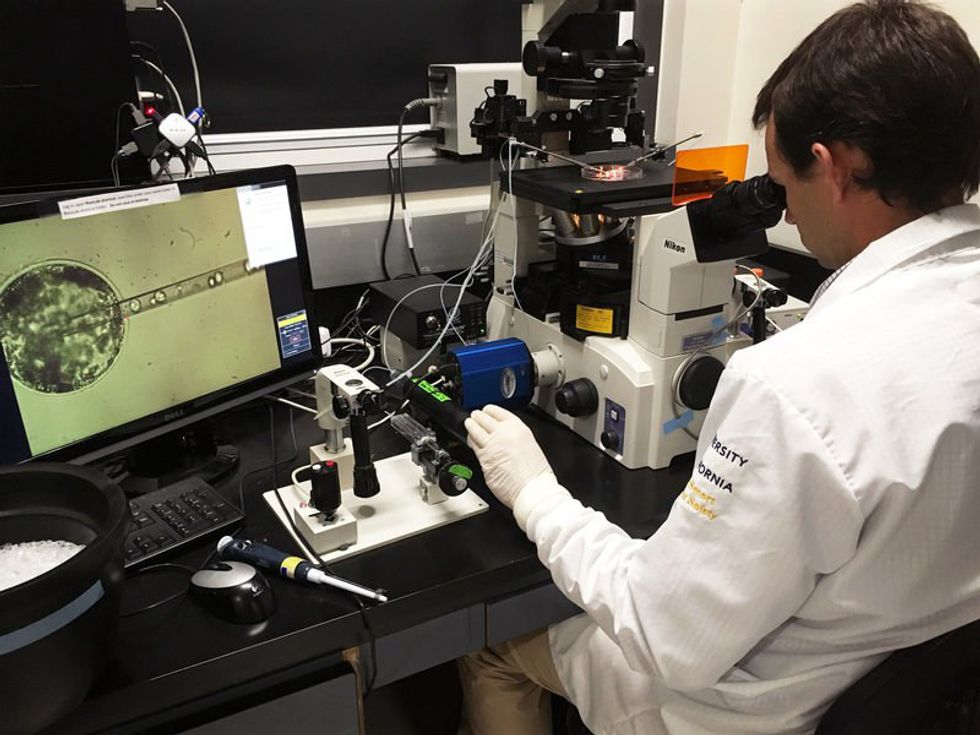In Greek mythology, a chimera is a monstrous creature with the heads of a goat and lion, a body of a lion and a tail of a snake head. It’s an amalgamation of species that is terrifying to even think about being a reality. Is this what scientists are trying to create?
In all actuality, no, this is not what is currently undergoing scientific research. It’s actually just small animals such as rats and farm animals such as pigs and sheep. Scientists are however trying to introduce human genes into these animals, making a pseudo-human/animal hybrid.
While this sounds like the workings of a mad scientist, it’s actually being used for biomedical purposes. Researchers have found that certain animal DNA structures are so similar to our own that it is possible to introduce human cells into an animal embryo cell and have them develop. This would allow them to grow human organs in animals. The body parts could then be harvested and transplanted into very sick people to cure certain genetic illnesses.
This would be extremely beneficial and would mean an almost unlimited number of organs available for transplanting. People would not have to sit for years on a waiting list only to be told "no." A study from the University of Minnesota has already shown evidence that cells from a 62-day-old pig fetus that had certain human cells introduced into it has reversed a congenital eye defect.
Pablo Ross, a reproductive biologist at the University of California (Davis), is trying to create a pancreas that theoretically could be transplanted into a patient with diabetes.
Human induced pluripotent stem cells, or iPS for short, are cells that can turn into any type of cell or tissue in the body. They can be made from simple human skin cells, so they aren’t hard to obtain. Since they can be made from the person’s own skin cells it makes it much less likely that the body will reject the transplanted organ.
Ross achieves this feat by injecting cells into the womb of a female pig. When the embryo reaches 28 days, the embryos are harvested and dissected to make sure that the right cells are growing into a pancreas and not another form of human tissue.
However, while this discovery sounds miraculous for the people it could cure and the potential for the amount of different illnesses that can be cured, it is a very controversial subject. So much, in fact, that the National Institute of Health (NIH) refuses to fund the research until more information is found and reviewed. All of the research that is currently underway is funded completely by donors.
The NIH and many other people are unsure whether this could be considered completely ethical. While the aim is to create specific organs, the cells can sometimes form into different tissue, such as the brain. If this happens, scientists don’t know if the animals could have human-type needs or even form a human-like consciousness. This is an extremely slim possibility. Even though these animals are close to our DNA, scientists are sure their brains are far too small and different enough that it is not possible for an animal to have a human consciousness.
Jason Robert, a bioethicist at Arizona State University says that “by inserting [these cells] into other animals and giving those other animals potentially some of the capacities of humans. . .this could be a kind of violation — a kind of, maybe, even a playing God."
Is this ethical? Do we have the right to mix animals and humans and blur the line between what is and is not human? Do the benefits outweigh the ethical issues? What if an animal did form a human consciousness? What would we do? It would certainly give animal rights a whole new meaning. This research is quickly gaining ground and, maybe someday soon, support. Someday this may be a viable alternative to waiting for an organ donor. We will have to wait and see what becomes of these scientific chimeras.











 The minimum wage is not a living wage.
StableDiffusion
The minimum wage is not a living wage.
StableDiffusion
 influential nations
StableDiffusion
influential nations
StableDiffusion












